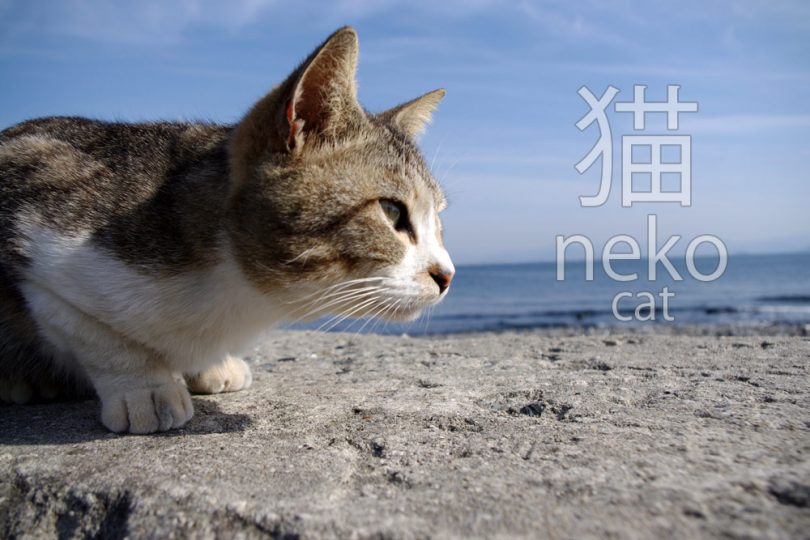It’s not a secret.
I love cats and I adore the way cats are “implemented” in the Japanese language.
Today I want to introduce a few cat expressions and phrases in Japanese that you might want to remember!
Don’t worry, they’re not very difficult and even someone with only basic Japanese knowledge should be able to understand them.

The word “cat” in Japanese
Cat is “neko” in Japanese. It’s usually written in kanji (猫), but you often also see the katakana (ネコ) or hiragana (ねこ) version.
The sound a cat makes is not “meow”, but “nya(n)” – にゃ(ん).
That’s why little kids often don’t say “neko”, but “nyanko” or “nyanko-chan” (にゃんこちゃん) when they see a cat.
Even popular mascots have “nyan” in their name. Best example is Hikone’s “Hikonyan” (ひこにゃん).
In a lot of anime or manga series with cat(-like) characters, you’ll notice they don’t speak “standard Japanese”.
Words or sentence endings with “na” are changed into “nya(n)”.
For example, “nantoka naru” (it’ll work out somehow) becomes “nyantoka nyaru”.
It also sounds a lot cuter. Try to pay close attention next time you watch / read something in Japanese with a cat character.

Cute cat items I bought in Yufuin where you can observe the “nya”-phenomenon. ;)
Cat expressions and phrases in Japanese
There are several “cat-themed” words and even more proverbs (諺, kotowaza) in the Japanese language. Here’s a small selection of my favorites:
Nekojita (猫舌) – Cat Tongue
If you’re like me, then you have a “cat tongue” (nekojita, 猫舌).
What does that mean?
That expression is used for people who cannot drink burning hot stuff and need to wait until it has cooled down quite a bit.
I always hated the fact that I cannot drink something immediately, but once I heard that Japan has such a cute word for it, I was ok with it. ;P
Do you have a nekojita?
Neko wo kaburu. (猫を被る。)
Literally it means wearing a cat (like wearing a cat costume / mask), but it’s like saying “butter wouldn’t melt in his / her mouth”.
You’re trying to look innocent by wearing a cat costume? Hm. Interesting. ![]()
Neko ni koban. (猫に小判。)
Literally it means giving a cat a koban (an Edo period coin – the one Maneki Neko are usually holding).
Maybe you can already guess what it’s used for: “Casting your pearls before swine.”
Obviously something you shouldn’t do. You’re giving someone something that’s way too good / above their level. They don’t even know what to do with it – like a cat wouldn’t know what to do with a coin, right? Swine don’t know what to do with pearls … maybe other than eating them.
Neko ni katsuobushi. (猫に鰹節。)
Katsuo is a yummy fish (*especially famous in Kochi Prefecture) and katsuobushi refers to my beloved bonito flakes. If you put these near a cat, you know what will happen. It is used to describe a situation where you cannot lose your focus or something bad will happen. ;)
For example, when you let a little kid sit right next to cookies after telling them not to touch them. Guess what will happen?
I think the closest expression in English would be: “Setting the wolf to guard the sheep.”
Neko no te mo karitai. (猫の手も借りたい。)
“I want to borrow even a cat’s paw.” It means you’re so busy, you’d need a thousand hands to finish it all.
I think that’s a feeling we all know well, so it’s good to remember this expression. Though, I’m not sure how helpful a cat’s paw really is (other than being cute when floating in your coffee ..)
Kysuuso neko wo kamu. (窮鼠猫を噛む。)
A mouse that has been driven into a corner will bite the cat.
It means that even if one’s cornered, even on the verge of death the weak ones can win if they’re brave: “Despair turns cowards courageous.”
Neko mo shakushi mo. (猫も杓子も。)
The cat, too, the dipper, too!
What? It just means “each and every one”, “every Tom, Dick and Harry” (like we use “Hinz und Kunz” in German).
In Western countries we seem to use people’s names, but in Japan it’s cats and dippers? ![]()
This is so random, maybe that’s why I like it.
Neko no ko ippiki inai. (猫の子一匹いない。)
There’s not even one kitten meaning there’s absolutely nobody there.
Kittens are usually called “koneko” (子猫), the one used here is literally “a cat’s child” (猫の子).
Cats are counted with “-hiki” like most smaller animals (one cat = ippiki, 2 cats = nihiki, 3 cats = sanbiki, …).
Counting in Japan can be quite complicated. You can read more about it here on Tofugu.
In the worst case just do it like the little kids and count EVERYTHING using: 1-ko (一個, ikko), 2-ko (二個, niko), 3-ko (三個, sanko) etc.
What are your favorite cat expressions and phrases in Japanese?
Of course, there are a LOT more! I just picked a few I really like.
Do you know any cat expressions or phrases in Japanese?
What are your favorites and why?
Tell us in the comments below!![]()









Great article Jasmine! I made me laugh out loud. :-D
In Holland we have a saying similar to ‘Neko ni katsuobushi’ which also involves a cat. It’s called ‘Je moet de kat niet op het spek binden’ or ‘You shouldn’t tie a cat to bacon’. It has the same meaning as the Japanese saying. :-D Furthermore i too have a Nekojita, but now i can be proud of it haha!
Aww, the Dutch one is so cute as well!
I hope I can remember that one. ;)
Thanks for sharing!
Hmm… perhaps Okazaki kids are different.. my boy and the other kids around him don’t say “nyanko”, but “nya-nyan”. My son occasionally tries to translate this to English and ends up calling them “meow meow”. That’s actually pretty good… he mixes or simply combines with many other words, for example he often calls dogs “wan wan doggie”
I like cats too (and pets in general), but my wife doesn’t so we don’t have any. ;; I’m hoping that when my boy gets a little older, we can both pressure her into accepting one ;)
Anyway, great list of phrases here, Jasmine. Good post!
It might be a dialect / regional thing. I’ve never heard any of my students say “nyan-nyan”, but I’ve only ever lived in Western Japan, so there you go. ;)
Aww, “wan wan doggie” is so cute. *g*
Good luck in persuading your wife when the time has come. ;)
Okay, there was nothing cute about the mental image of a cat paw floating in a cup of coffee even though a second later I remembered what you were talking about ;)
I definitely have Nekojita. That’s why I prefer my coffee & tea with cold milk so it cools down to drinkable temperature. Not a good thing to have when you love ramen though :)
Haha, sorry about the horrible picture that you probably had in mind. ;)
Slurping ramen actually REALLY helps, but I keep burning my tongue when I try to drink tea and stuff. I guess I just never learn my lesson. (^-^’)
I get the feeling every non-Japanese actually has a nekojita and the Japanese just got used to drinking burning hot stuff over the years XD I definitely have a nekojita and I was SO happy when I learned the expression, because I took some lessons in tea ceremony and lacked an explanation for my incapability of sipping the tea 10 seconds after it was made from boiling water!!!
The 鰹節を猫に預ける I Iearned as 魚を猫に預ける – so I guess you should just never let a cat guard anything edible :P
Really? A lot of my German friends and family members don’t have a nekojita. They can drink hot stuff almost immediately.
I thought it was only me, but once I found out about the cute expression in Japanese, I was kind of happy. *g*
That’s right – especially not fish! I remember how crazy my cat always got about anything “fishy”. XD
Damn, now I have to rethink my theory about everyone besides the Japanese being nekojita XD XD XD In my family, everyone is nekojita. I remember when my husband visited us for the first time in Germany and my whole family sat at the breakfast table with mouths wide open, as my husband sipped boiling hot coffee that had left the coffee maker only seconds ago XD
Haha, and people always thought I didn’t like what they served me. I just couldn’t drink it right away! T_T
Interesting stuff — thanks for posting.
By the way, ever heard of the anime Gakkou Gurashi (a.k.a. School-Live)? The main character, Yuki, wears a hat with cat ears… and I won’t spoil exactly why, but one of the expressions you discussed is very relevant.
I don’t know that one, but it sounds interesting. :)
十人十色 is my favourite phrase, which means, ‘Each to their own’. I often use it to help students learn their own way to understand English and how to study, and to explain cultural differences.
I really like your blog.
Yes, there are a lot of 四字熟語 (4 kanji phrases) like that that I really adore. (I also like 一石二鳥, 一期一会 – and my favorite: 自業自得.)
Maybe I should post about them at some point as well.
Thank you. Glad to hear that! ^__^